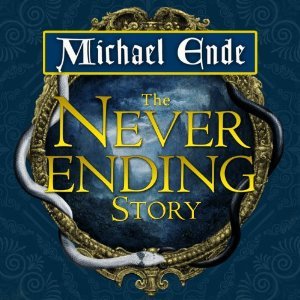- The Good: Ultimate story of becoming so entwined in a book that you lose yourself in fantasy world
- The Bad: I wish there were sequels
- The Literary: A letter of the alphabet for each chapter; original German copies with different text colors that differentiate fantasy and reality
Escaping bullies, Bastian Balthazar Bux hides in an antiquarian bookshop, where he encounters a salty clerk and a mysterious book. On a whim, Bastian steals the book and skips his classes, hiding in the school’s dusty attic to read. In the pages of The Neverending Story, he loses himself in the enchanted world of Fantastica.
I hate to start a book review with reference to its film adaptation, but the 1984 movie of the same name is etched into my memory. Even though I loved the film as a child, it was years later before I realized the movie was based on a book, and another couple of decades before I sat down and read it. Maybe I shouldn’t be surprised, but I’m overjoyed to report the book is even better than the film.
The Neverending Story is a children’s book, but it’s dense imagery and mythology reignites my childlike wonder. It now sits on the same metaphorical shelf as the Narnia, Oz, Earthsea, Last Unicorn, and Harry Potter books. All of these books are more than mere adventure stories set in fantasy worlds. The Neverending Story is a bookification of the collaboration between writer and reader, of becoming fully immersed in a story, and creating worlds anew each time you crack open that spine. Fantasy and imagination are necessary, not just in Fantastica which is actively dying without it, but also in the real world.
If you’ve seen the movie, that will sound familiar. Bastian reads about Atreyu’s quest to find a cure for the Childlike Empress, the mysterious and benevolent ruler of all Fantastica, which is also being consumed by a formless entity called The Nothing. With the aid of the powerful medallion Auryn, Atreyu is led to Morla the aged giant turtle, Uyulala the invisible oracle, Falkor the luckdragon, and Gmork the wolf, to find a human child that can give the Childlike Empress a new name. At last, Bastian becomes a part of the neverending story.
But the story doesn’t end there. In fact, that’s only half of Ende’s tale. For the sake of avoiding even more spoilers, suffice to say that Bastian turns from hero to anti-hero, and eventually learns that escaping into books won’t solve his real-world problems. For every new wish and story he creates for Fantastica, Bastian loses a memory of his life. In the end, Bastian loses everything. I’ll let you find out if he makes it home.
I’m still digesting the moral of the second half of this story. Maybe it’s just that magic has consequences. Or arrogance and power corrupt. Or maybe it’s a metaphor for growing old, losing ourselves in the problems of adulthood, and forgetting innocence and wonder. Maybe it’s that all stories are products of stories, and it’s our job to make sure they don’t end. The best fantasy isn’t pure escapism; the best fantasy enhances reality and our relationships to others.
Absolutely highly recommended for any fan of fantasy!
